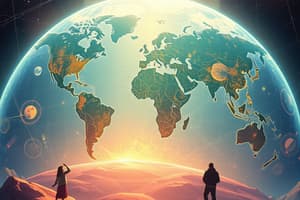Podcast
Questions and Answers
Which of the following best describes the primary focus of globalization?
Which of the following best describes the primary focus of globalization?
- Political unification and governance.
- Economic processes and integration with social and cultural aspects. (correct)
- Environmental conservation and sustainability efforts.
- Technological advancements and digital infrastructure development.
Globalization exclusively benefits multinational corporations by allowing them to exploit developing economies.
Globalization exclusively benefits multinational corporations by allowing them to exploit developing economies.
False (B)
According to Anthony Giddens, how does globalization affect local events?
According to Anthony Giddens, how does globalization affect local events?
Local events are shaped by occurrences many miles away.
Globalization encourages countries to act like _______, attracting global capital by opening up their economies to multinational corporations.
Globalization encourages countries to act like _______, attracting global capital by opening up their economies to multinational corporations.
Match the author with their definition of globalization:
Match the author with their definition of globalization:
Why is studying the contemporary world deemed important?
Why is studying the contemporary world deemed important?
The term 'contemporary' refers exclusively to events that occurred before the 20th century.
The term 'contemporary' refers exclusively to events that occurred before the 20th century.
List two reasons why studying the contemporary world is important.
List two reasons why studying the contemporary world is important.
Which of the following best describes globalization, according to Roland Robertson's view?
Which of the following best describes globalization, according to Roland Robertson's view?
Internationalization is a broader concept than globalization, encompassing all forms of cross-border interactions.
Internationalization is a broader concept than globalization, encompassing all forms of cross-border interactions.
What is the primary aim of economic liberalization?
What is the primary aim of economic liberalization?
The spread of ideas, knowledge, technology, culture, and religion is a characteristic of ______.
The spread of ideas, knowledge, technology, culture, and religion is a characteristic of ______.
Match the following concepts with their correct descriptions:
Match the following concepts with their correct descriptions:
Which of these is an indicator of globalization?
Which of these is an indicator of globalization?
A globalized company's units operate independently without any common strategy or resource pool.
A globalized company's units operate independently without any common strategy or resource pool.
Name three types of globalization mentioned in the content.
Name three types of globalization mentioned in the content.
Flashcards
Contemporary
Contemporary
Happening now or in recent times; existing in the same time period.
Contemporary World
Contemporary World
The circumstances, ideas and problems of the present age in the modern world.
Why study the Contemporary World?
Why study the Contemporary World?
To be aware of world problems, understand relationships between societies, develop competencies, construct knowledge and increase critical judgment.
Globalization
Globalization
Signup and view all the flashcards
Globalization
Globalization
Signup and view all the flashcards
Globalization
Globalization
Signup and view all the flashcards
Globalization
Globalization
Signup and view all the flashcards
Globalization
Globalization
Signup and view all the flashcards
Globalization Characteristics
Globalization Characteristics
Signup and view all the flashcards
Globalization Indicators
Globalization Indicators
Signup and view all the flashcards
Nature of Globalization
Nature of Globalization
Signup and view all the flashcards
Internationalization
Internationalization
Signup and view all the flashcards
Liberalization
Liberalization
Signup and view all the flashcards
Globalization Involves
Globalization Involves
Signup and view all the flashcards
Internationalization Involves
Internationalization Involves
Signup and view all the flashcards
Study Notes
- Contemporary refers to things happening or beginning now, or in recent times, and existing or happening in the same time period
- Contemporary world involves the circumstances and ideas of the present age, modern times and world, and present times
Why it's important to study the contemporary world:
- To be aware of the problems the world faces and interested in them
- To understand different natures and relationships between world societies and organizations
- To develop competencies, construct knowledge, and increase critical judgment
- To instill a sense of global citizenship and ethical responsibility
Defining Globalization:
- It is the increasing interaction of people, states, or countries through the growth of the international flow of money, ideas, and culture
- It is primarily focused on economic processes or integration with social and cultural aspects
- The interconnectedness of people and business across the world can lead to global, cultural, political, and economic integration
- Enables ability to move and communicate easily internationally to conduct business
- Free movement of goods, services, and people across the world occurs in an integrated way
- Liberalization of countries' impact protocols welcomes foreign investment into sectors that are the mainstays of their economy
- Globalization refers to countries acting like magnets, opening up their economies to multinational corporations to attract global capital
Globalization defined by other experts:
- Martin Albrow and Elizabeth King define globalization as a process by which the people of the world are incorporated into a single world society
- Anthony Giddens defines globalization as the intensification of worldwide social relations linking distant localities, such that local happenings are shaped by events far away, and vice versa
- Prof. Roland Robertson(Sociology) defines globalization as the compression of the world and the intensification of the consciousness of the world as a whole
Characteristics of Globalization:
- A social mobility of people regardless of reason
- Intensification of interactions
- It's an active process
- Borderless interaction
- Encompasses the spread of ideas, knowledge, technology, culture, religion, etc
Historical Foundation:
- In 1897, Charles Taze Russel coined the term "Corporate Giants"
- In 1930, "Globalize" appeared as a noun referring to a holistic view of human experience in education
- Globalization was coined in the late 1970s
- In early 1981, Globalization was used as an economic term
- In the late 1980s, globalization was popularized by Theodore Levitt
- The IMF identified four basic aspects of globalization in the late 2000s
- Globalization was used to define "borderless society" in 2013
- Globalization was often used in the Academe in 2017
- In 2018, Globalization was widely used in all disciplines
Indicators of Globalization:
- Interdependence of countries
- Advancement of science, tech, etc
- Environmental issues across borders
- Economic, cultural, and political elements
Nature of Globalization:
- A conglomerate linking various multiple units in different global locations linked by common ownership
- Units draw from a common resource pool including money, credit, information, patents, trade names, and a control system
- Product presence spans different world markets with highly diverse human resources
- The units respond to a common strategy
- Transactions involve intellectual properties like copyrights, patents, trademarks, and process technologies across the globe
Reasons for Globalization:
- Rapidly shrinking time and distance made possible by technology
- Domestic markets are no longer rich due to many interlocking factors
- Companies seek political and economic stability in other countries
- To gain technological and managerial know-how from other countries' advancements in science, technology, education, health, etc
- Reduces high transportation costs due to advanced tools
- Proximity to raw materials and markets not available domestically
- The creation of the World Trade Organization (WTO) stimulated increased cross-border trade
- Organizations like the UN and arbitration bodies facilitate country agreements
Globalization vs Internationalization:
- Globalization = increased interconnectedness and interdependence among countries, economies, cultures, and societies involving the flow of goods, services, capital, information, technology, and people across national borders
- Internationalization = expanding a business or organization's operations across national borders
- Internationalization includes companies entering foreign markets, establishing subsidiaries/branches, or engaging in international trade and investment
Globalization vs Liberalization
- Liberalization, specifically economic liberalization = reducing government regulations and restrictions on economic activities, especially trade, investment, and market competition
- Economic liberalization reduces tariffs, trade barriers, and foreign investment restrictions, promoting free-market policies
- The goal of liberalization is to encourage economic efficiency, competition, and growth by allowing market forces to determine prices, production, and allocation of resources
Globalization vs Universalization:
- Universalization = making something universally applicable, regardless of geographical, cultural, or other differences
- Universalization often pertains to universally applicable principles, values, or norms
- Human rights can be associated with universalization due to their claim to apply to all individuals, regardless of nationality or background
Globalization vs Westernization
- Westernization = societies adopt/become influenced by cultural, social, economic, and political norms, values, and practices traditionally associated with North America and Western Europe
- This influence manifests in adopting Western-style clothing, consumer products, technology, political systems (e.g., democracy), legal frameworks, individualized cultural norms
Stages of Globalization:
- Stage 1 involves an essentially domestic company/institution moving into a new overseas market by linking up with local dealers and distributors
- Stage 2 is when the company/institution takes over its activities on its own
- Stage 3 is when the domestic-based company institution handles its own manufacturing, marketing, and sales in key foreign markets
- Stage 4 involves the company/institution being fully integrated in these markets, with support for research and development (R&D) and engineering, but headquarters mentality remains
- Stage 5 is when the company/institution moves towards a genuinely global mode of operation adapting to customer needs, denationalizing its operations, and creating a globally shared system of values
Merits of Globalization:
- Open economies spur fast innovation with fresh ideas from abroad.
- Export jobs pay more than other jobs.
- Productivity grows more quickly when countries produce goods and services in which they have a comparative advantage
Demerits of Globalization:
- Exploitation of underdeveloped countries.
- Growing inequality, increasing the rich-poor gap.
- Harmful effects on small industries and businesses.
Studying That Suits You
Use AI to generate personalized quizzes and flashcards to suit your learning preferences.
Related Documents
Description
Study of the contemporary world is important to be aware of current global problems. It helps in understanding relationships between societies and organizations. It also develops competencies, critical judgment, global citizenship and ethical responsibility.



